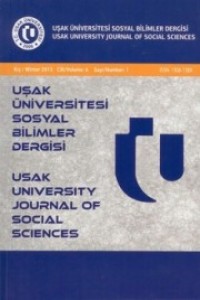Öz
Kaynakça
- Bouson, J. Brooks. (2000). Quiet as it’s kept Shame, Trauma and Race In the Novels of Toni Morrison. New York: State University of New York Press.
- Butler, Judith. (2002). Gender Trouble: Feminism and the Subversion of the Identit. New York: Routledge.
- David, Ron. (2000). Toni Morrison Explained. New York: Random House Inc.
- Joyner, Louisa. (2003). The Essential Guide to Contemporary Literature. London: Vintage.
- Kubitschek, Missy Dehn. (1998). Toni Morrison A Critical Companion. New York: Greenwood Press.
- Morrison, Toni. (1998). Paradise. London: Vintage.
- Rishoi, Christy. (2003). From Girl To Woman: American Women‟s Coming of Age Narratives. New York: State University of New York Press.
- Rooney, Ellen. (2006). The Cambrige Companion to Feminist Literary Theory. New York: Cambridge University Press.
- Widdowson, Peter. (2001). “The American Dream Refashioned: History, Politics and Gender in Toni Morrison's "Paradise".”Journal of American Studies. Vol. 35, No. 2, Part 2: Warring in America: Encountersof Gender and Race, pp. 313-335. 03/10/2014
- <http://www.jstor.org/stable/27556969>
Öz
The Society of USA is consisted of many different racial groups. It could be said that among these groups African Americans are the ones who suffered mostly from the segregation of the white male. However, there is a more disadvantageous group in African Americas as African American women who are segregated by not only while males but also black males. From this point, Toni Morrison becomes the voice of this suppressed group of American society in her novel Paradise (1997).
In this study, the way Morrison represents the African American women is analyzed. For this analysis, the racist approaches and feminist approaches in American literature provides the analysis. From this point, the suppression of the African American women by religious and racist approaches is analyzed. By this analysis, how the African American women are segregated is told. Moreover, the relation of gender and religion, their effect on women and reflection of all these on real lives of African American women is told.
Finally, the analysis of the work within these approaches reveals the representation of black woman and the effects of religion on their lives.
Keywords: Race, Religion, USA, Woman, Man
Kaynakça
- Bouson, J. Brooks. (2000). Quiet as it’s kept Shame, Trauma and Race In the Novels of Toni Morrison. New York: State University of New York Press.
- Butler, Judith. (2002). Gender Trouble: Feminism and the Subversion of the Identit. New York: Routledge.
- David, Ron. (2000). Toni Morrison Explained. New York: Random House Inc.
- Joyner, Louisa. (2003). The Essential Guide to Contemporary Literature. London: Vintage.
- Kubitschek, Missy Dehn. (1998). Toni Morrison A Critical Companion. New York: Greenwood Press.
- Morrison, Toni. (1998). Paradise. London: Vintage.
- Rishoi, Christy. (2003). From Girl To Woman: American Women‟s Coming of Age Narratives. New York: State University of New York Press.
- Rooney, Ellen. (2006). The Cambrige Companion to Feminist Literary Theory. New York: Cambridge University Press.
- Widdowson, Peter. (2001). “The American Dream Refashioned: History, Politics and Gender in Toni Morrison's "Paradise".”Journal of American Studies. Vol. 35, No. 2, Part 2: Warring in America: Encountersof Gender and Race, pp. 313-335. 03/10/2014
- <http://www.jstor.org/stable/27556969>
Ayrıntılar
| Bölüm | Makaleler |
|---|---|
| Yazarlar | |
| Yayımlanma Tarihi | 29 Temmuz 2016 |
| Yayımlandığı Sayı | Yıl 2016 Cilt: 9 Sayı: 27/3 |
Adres: Uşak Üniversitesi Sosyal Bilimler Enstitüsü
Telefon: 0276 221 21 60 Faks :0276 221 21 61
E-posta: sosyaldergi@usak.edu.tr


